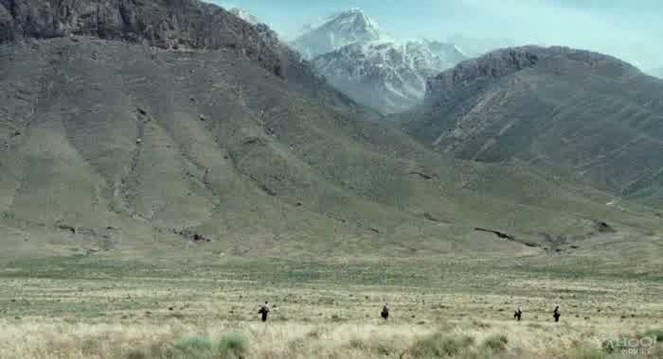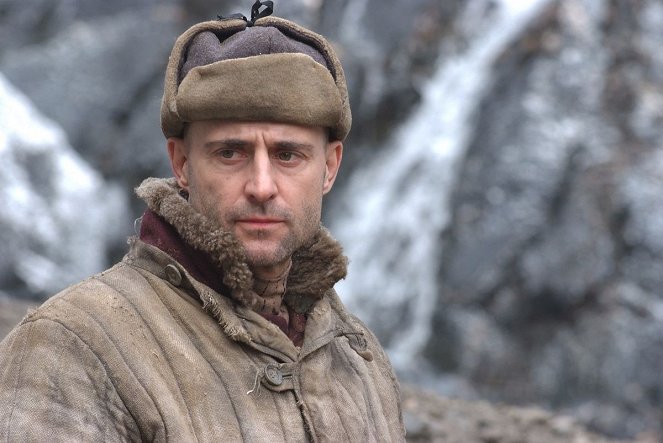Directed by:
Peter WeirCinematography:
Russell BoydComposer:
Burkhard von DallwitzCast:
Jim Sturgess, Colin Farrell, Ed Harris, Saoirse Ronan, Mark Strong, Alexandru Potocean, Gustaf Skarsgård, Sebastian Urzendowsky, Dragoș Bucur, Zahary Baharov (more)VOD (1)
Plots(1)
The film begins with Janusz, a Polish POW, being interrogated by a Soviet officer. Janusz refuses to admit his guilt. His wife is brought in to the room and forced to make a statement condemning Janusz. Janusz is sentenced to 20 years in the gulag. At the camp in Siberia, Janusz meets Mr Smith, an American; an actor named Khabarov; Valka, a hardened Russian criminal; Tomasz, who makes a living by sketching erotic drawings in exchange for food and clothes; Kazik, a Pole who suffers from night blindness; Voss, a Latvian priest; and Zoran, a Yugoslav accountant. Khabarov confides to Janusz that he has a plan for escaping. Khabarov's proposed route is south to Mongolia, passing Lake Baikal. Mr Smith tells Janusz that Khabarov is fantasising about his desire to escape in order to improve his own morale, and that, in his opinion, escape is impossible. Janusz maintains his resolve. (Entertainment One)
(more)Videos (1)
Reviews (10)
Director Peter Weir already has a few masterpieces under his belt, but in this case, I really didn't get this film. It's too shallow, and the dialogues are informative so that even an American viewer unfamiliar with Soviet history can follow the plot. Moreover, the characters are black and white, and it's no coincidence that the only truly well-rounded character is the classic Russian criminal played excellently by Colin Farrell, who exudes genuine emotions, animality, and charisma. Unfortunately, the script does not prescribe him a more significant role, and he completely disappears halfway through the film. This subject matter directly called for a series adaptation in six to eight-hour episodes because there simply isn't enough room in this format for the development of characters and the viewer's acceptance of them. Despite the long runtime, many things are rushed through, and the viewer mostly follows a group of refugees walking through the taiga, desert, or high mountains without witnessing the small but characteristic moments, conflicts, and decisions for the survival of the characters. For example, the escape from the gulag is rushed, and many scenes are highly improbable. Escapes from the camps, for understandable reasons, took place during the hot Siberian summer, not in snowy blizzards and at -40°C... Overall impression: 55%. Despite good intentions, watching The Way Back is at times as descriptive and hastily done in its dramatic aspect as the suffering of the refugees themselves.
()
Nothing but a few above-average scenes that touch the heart. Otherwise, this film is too polished and cinematic, which shouldn't be surprising considering it was directed by a film classic and a person who rarely goes against the tide. Peter Weir is undoubtedly a great director, but his conservative style didn’t resonate with me here. He knows how to set up a good game, with an attractive thematic approach and a stellar cast, but he didn't completely captivate me. Without the crazy Colin Farrell and the raw Ed Harris, The Way Back would be nothing more than an average adventure film, where everything is as it should be, and the plot can be essentially predicted. The dream sequences are completely out of place. What I want is either a gritty, uncompromising film, or something that I can philosophise to. Having both doesn't work.
()
Peter Weir light. The overall impression is not that powerful, but the film offers a lot of unforgettable
details. You will enjoy getting to know different characters and the importance of the positive synergy of
their natures and abilities for achieving a common goal – survival and freedom. The Way Back features a
well-chosen cast, subtle and intelligent humor, and a slow pace with just a few dramatic moments. Do
not expect big things. Watch and listen. You’ll be satisfied with having learned something, and the
characters will remain in your memory.
()
A film of two meaning planes and two faces. The Way Back is about escaping Siberia (surprisingly), a physically devastating journey through Asia, through mountains, deserts and mountains again, to get to freedom. But it also deals, on a symbolic level, with a journey through the history of Central and Eastern Europe, a path to forgiveness. Uh, oh! Like Hollywood's attempts to stage the tragedy of the Holocaust, the first attempt to stage the horrors of the Gulag gives the impression of an explanatory and average staged theatre that aims to make the viewer who is unfamiliar with the facts to understand and feel. For obvious reasons, this trick can only work in an uninspired way and without any depth. In general, however, the further away the heroes are from the traumatic space of the Gulag, the more we learn about them, and the more Weir discusses their individual stories, the better and more cinematically convincing The Way Back is (the highlight is the Mariana scene in the desert, which was the only one in the film that really moved me with the sheer power of cinematic speech). On the other hand, the closer the heroes get to great history, the more constructed the film feels – it is a high school textbook of the crimes of communism for the uninitiated. It takes away a lot of energy and authenticity (unfortunately, this is also related to the very special choice of the dominant language variant and Ed Harris as the story mediator for American audiences). You can get used to it, but the aftertaste of artificial tragedy can't be completely gotten rid of. Like all similar films, this historical trauma is obscured by mandatory sentiment rather than being open to analysis and understanding... It gets points for the excellent (and only truly ambivalent) character of the thief Valek, famously played by Colin Farell.
()
The nonsensically edited first half, which doesn't let a single scene resonate, battles with the beautifully sprawling second half that pushes the limits of the widescreen camera to the limit. This takes points off Weir's film in the final rating despite the fact that he manages to introduce his characters using only a few words and make you like them without dramatizing the scene in any drastic way; he makes do with great actors, a few frostbite marks, and swollen lips from dryness.
()



Ads